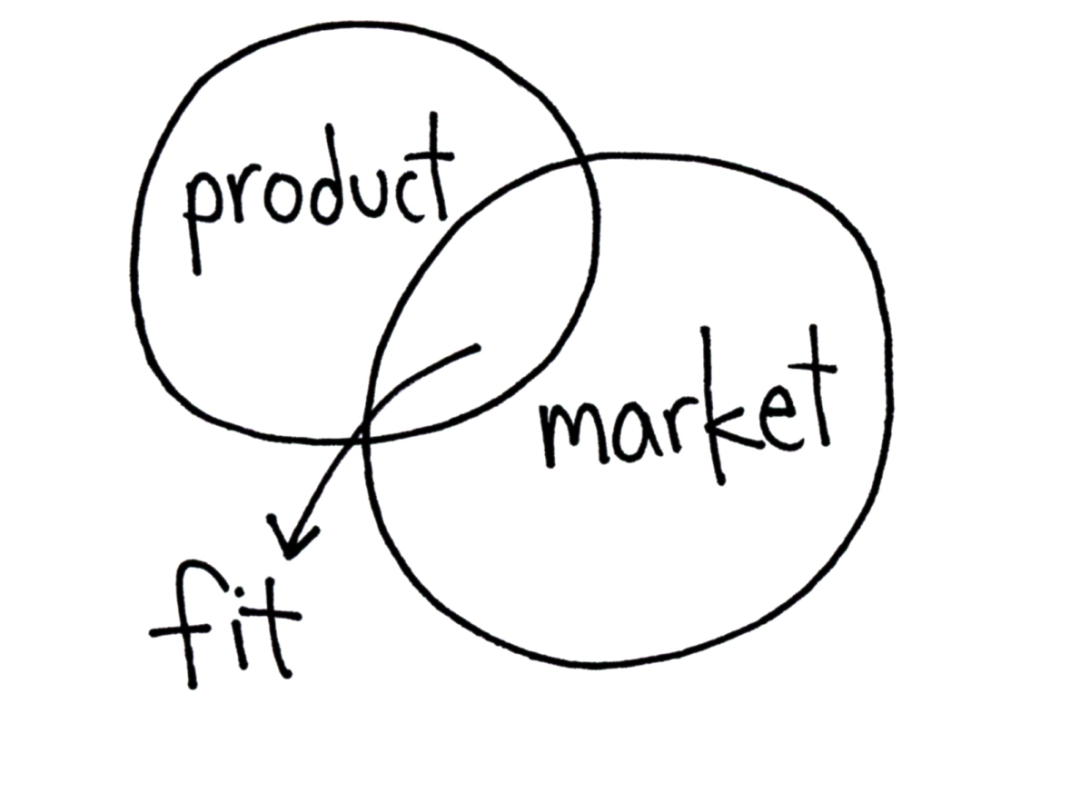Product/Market Fit: A Useful Definition
If lack of awareness is the only thing stopping most of the people in your target market from using your product, then you have Product/Market Fit.
Marc Andreessen's essay The Only Thing That Matters listed the 3 most common reasons put forth for a startup's success (team, market, product) and claimed that the market is the only factor that matters [1] for a product's success.
Marc discusses "product/market fit" (coined by Andy Rachleff) as being crucial to success, and explains the phenomenon as when the market "pulls" a product out of a team.
That's vague, so every startup founder seems to have his or her own concrete definition of product/market fit. A useful and concrete definition is needed, for two reasons. First, to know if you are there, although if you have to ask that question, the answer is probably no. The second reason is to know how to get there, which you can do by walking backward from that known destination to where you stand now.
One of the concrete ways product/market fit is explained is when a lot of your users (40% is frequently cited) would be pissed off if you shelved the product. This would be very useful if it were true, since founders could send out surveys and change the product or market to optimize for this percentage. However, i have made several apps that reached this point yet certainly had not reached product/market fit. In every case, the product was perfect for the large majority of active users, but no one outside that group wanted to use the app, even if they were the target audience. For example, MealMe started off as the social media for food. Every active user loved the app and would've been pissed if we shelved the product, but they couldn't convince their foodie friends to download it. We were "overfitting" users on the product.
I've personally seen 6 apps rank in the charts for Top Paid, and experienced product/market fit on 3 of those. Here is what product/market fit is currently looking like on one of my apps, as shown by day-by-day revenue over the past 3 months:

After over a year of steady, decent revenue on this one app, and features/updates being pushed every month or so, i released one update 2 months ago. It resulted in accelerating growth that makes the decent amount of the past look negligible. I didn't pay a penny on marketing.
So, here is my concrete and useful definition of what product/market fit really is:
If lack of awareness is the only thing stopping most of the people in your target market from using your product, then you have Product/Market Fit.
When you reach this point, you have reached product/market fit, and the main focus should be making sure everyone in that market hears about the product.
Note that achieving product/market fit doesn't necessarily mean the product will create much captured value (wealth). Value is dependent on the size of the market. For example, one of my apps (Mideo) has reached product/market fit, but the target market is quite small: iPhone and Android users who don't want their music to pause when they record a video. It still has been one of the top paid apps on both iOS and Android for months, with hundreds of thousands of users on both operating systems, but the market size pales in comparison to the target market of Ford's Model T.
I find this definition useful for iterating towards product/market fit. A product must have something immediately compelling enough for someone in my target audience to try my product and like it enough to return. These are both quantifiable and concrete as the conversion rate and cohort retention. [2]
For example, MealMe's (current) target market consists of people who want to order food and save money or time. Even if MealMe is better in every way than any other food delivery app, that isn't necessarily enough to immediately convince most food delivery users to swap out their current product for MealMe.
The product has to be so much better than any existing solution that it'll be instinctual for most food delivery users to use MealMe if they are aware of it. Then I'll market it, go after a larger target market, iterate to reach product/market fit in that larger market, and repeat.
Notes
[1]: The only thing i would add: if a team is truly great, they will keep iterating or pivoting the product or market until they reach product/market fit. Success is inevitable for a determined founder. For this reason, Determination is the only thing that matters for a team, although the market is the only thing that matters for a product.
[2]: This could be seen as trying to create a science out of what was previously seen as an art. It's possible that the art would be left to finding the right combination of product and market. However, that search might not be an art at all. What if it is chance? If so, then Determination really is the only thing that matters - determined founders get more lottery tickets every day they work. The intelligence of the founder increases the odds on each ticket.
